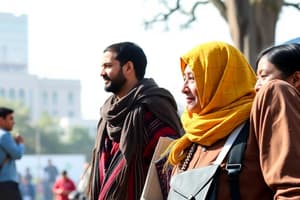Podcast
Questions and Answers
What does cultural identity primarily refer to?
What does cultural identity primarily refer to?
- A person's career choice and achievements
- A person's level of education
- A person's feeling of belonging to a group (correct)
- A person's financial status in society
Which statement best defines political identity?
Which statement best defines political identity?
- It indicates personal hobbies and interests.
- It expresses an individual's profession.
- It focuses only on economic beliefs.
- It reflects membership in a group with specific political views. (correct)
Which of the following is NOT a branch of anthropology?
Which of the following is NOT a branch of anthropology?
- Cultural Anthropology
- Biological Anthropology
- Psychological Anthropology
- Sociological Anthropology (correct)
What constitutes the focus of psychology within social sciences?
What constitutes the focus of psychology within social sciences?
Which individual is recognized as the father of sociology?
Which individual is recognized as the father of sociology?
Which philosophical stage comes AFTER the theological stage according to Auguste Comte?
Which philosophical stage comes AFTER the theological stage according to Auguste Comte?
What does economics study in the context of social sciences?
What does economics study in the context of social sciences?
What is the primary concern of sociology among social sciences?
What is the primary concern of sociology among social sciences?
Which ideology promotes economic equality and individual freedom?
Which ideology promotes economic equality and individual freedom?
What type of culture includes physical objects created by people?
What type of culture includes physical objects created by people?
Which of the following concepts describes shared rules of conduct in a society?
Which of the following concepts describes shared rules of conduct in a society?
The Philippine Eagle is known scientifically as what?
The Philippine Eagle is known scientifically as what?
What does the term 'mores' refer to in cultural aspects?
What does the term 'mores' refer to in cultural aspects?
Which of the following is considered a non-material cultural aspect?
Which of the following is considered a non-material cultural aspect?
Which of the following best defines 'folkways'?
Which of the following best defines 'folkways'?
Which national sport is also known as Kali and Eskrima?
Which national sport is also known as Kali and Eskrima?
What is the effect of degradation on human beings?
What is the effect of degradation on human beings?
Which of the following is not a feature of the common good?
Which of the following is not a feature of the common good?
What type of rights are considered inherent to man and given by God?
What type of rights are considered inherent to man and given by God?
Which classification of rights includes the right to vote and the right to be voted into public office?
Which classification of rights includes the right to vote and the right to be voted into public office?
Which of the following best describes objectification?
Which of the following best describes objectification?
Which statement best describes the concept of culture?
Which statement best describes the concept of culture?
What does culture clash refer to?
What does culture clash refer to?
Which of the following characteristics highlights that culture is dynamic?
Which of the following characteristics highlights that culture is dynamic?
What is meant by the term culture patterns?
What is meant by the term culture patterns?
Which of the following is a characteristic of culture being shared?
Which of the following is a characteristic of culture being shared?
Culture relativism involves assessing a culture based on what?
Culture relativism involves assessing a culture based on what?
In the functionalist perspective, society is viewed as what?
In the functionalist perspective, society is viewed as what?
What does the term culture universal refer to?
What does the term culture universal refer to?
What is the primary function of Malacañang Place?
What is the primary function of Malacañang Place?
Which civilization is known for building houses and making fine pottery?
Which civilization is known for building houses and making fine pottery?
What concept refers to how individuals acquire values and behaviors appropriate to their culture?
What concept refers to how individuals acquire values and behaviors appropriate to their culture?
From which civilization did the concept of democracy originate?
From which civilization did the concept of democracy originate?
What is defined as inappropriate behavior that society finds offensive?
What is defined as inappropriate behavior that society finds offensive?
What type of norms are learned intuitively as we grow up?
What type of norms are learned intuitively as we grow up?
Which civilization established a Republic without a king?
Which civilization established a Republic without a king?
Which of the following is not considered a category of norms?
Which of the following is not considered a category of norms?
Flashcards are hidden until you start studying
Study Notes
Identity Concepts
- Identity: Expresses individual beliefs and social affiliations, including nationality, gender, and sexuality.
- Cultural Identity: Reflects belonging and connection to a specific group or culture.
- Political Identity: Involves expressing political opinions and attitudes based on group membership.
- Social Identity: Pertains to self-perception concerning gender, religion, and community involvement.
Sociology Overview
- Definition: Examines human social behavior in a scientific manner.
- Relationship to Social Sciences:
- Anthropology: Studies human cultures, both past and present.
- Psychology: Focuses on behavior and cognition.
- Economics: Analyzes choice and resource allocation.
Branches of Anthropology
- Biological Anthropology: Looks at Homo sapiens as biological beings through time.
- Cultural Anthropology: Describes and compares human group adaptations.
- Electoral Anthropology: Examines the connection between the public and policymakers.
Culture Defined
- Culture: Encompasses customs, traditions, ethics, values, beliefs, and practices of a society.
- Types of Culture:
- Material Culture: Tangible objects (e.g., clothing, books).
- Non-material Culture: Intangible traits (e.g., language, ideas).
Aspects of Culture
- Symbols: Fundamental components of culture (e.g., handshake).
- Language: Structured symbols for communication.
- Values: Collective beliefs of right and wrong.
- Norms: Shared rules dictating conduct in various contexts.
- Folkways: Informal behavioral norms without strong moral implications.
- Mores: Significant norms with ethical connotations.
Characteristics of Culture
- Learned: Culture is acquired from various sources, including family and media.
- Dynamic: Cultures evolve in response to environmental changes.
- Integrated: Aspects of culture interconnect and influence each other.
- Shared: Culture is communal among group members.
- Symbolic: Based on arbitrary symbols that hold specific meanings.
Perspectives in Culture and Society
- Cultural Perspective: Understanding culture through the lens of environmental and social factors.
- Functional Perspectives: Society functions holistically, where each part contributes to overall stability.
- Humanistic Interpretive Perspective: Emphasizes subjective experiences in cultural study.
Important Cultural Concepts
- Culture Traits: Individual acts or beliefs tied to specific contexts.
- Culture Complex: Interrelated traits forming cultural clusters.
- Culture Patterns: Organized combinations of culture complexes.
- Culture Universals: Common needs shared globally.
- Culture Clash: Conflicts arising from differing cultural values.
- Culture Relativism: Judging a culture based on its own standards.
Historical Civilizations
- Sumerians: Notable for architecture and textile production.
- Egyptians: Relied on the Nile River; beliefs in an afterlife were prominent.
- Greeks: Introduced democracy; military training was enforced on youth.
- Romans: Established a Republic influenced by earlier cultures.
Human Rights
- Definition: Ethical principles governing freedom and entitlement in societies.
- Classes of Human Rights:
- Natural Rights: Inherent to individuals by nature or divine endowment.
- Statutory Rights: Established by law.
- Constitutional Rights: Protected under national law.
Categories of Norms
- Folkways: Informal social customs learned from context.
- Mores: Strongly held norms tied to ethical beliefs.
- Taboos: Behaviors deemed offensive or inappropriate.
- Laws: Formal rules defining legality.
Essential Ingredients for Human Dignity
- Respect for individuals’ rights and freedom from degradation and objectification.
Government and Society
- Importance of governance in maintaining law and order, social safety, and political participation to ensure public good and individual rights.
Studying That Suits You
Use AI to generate personalized quizzes and flashcards to suit your learning preferences.




